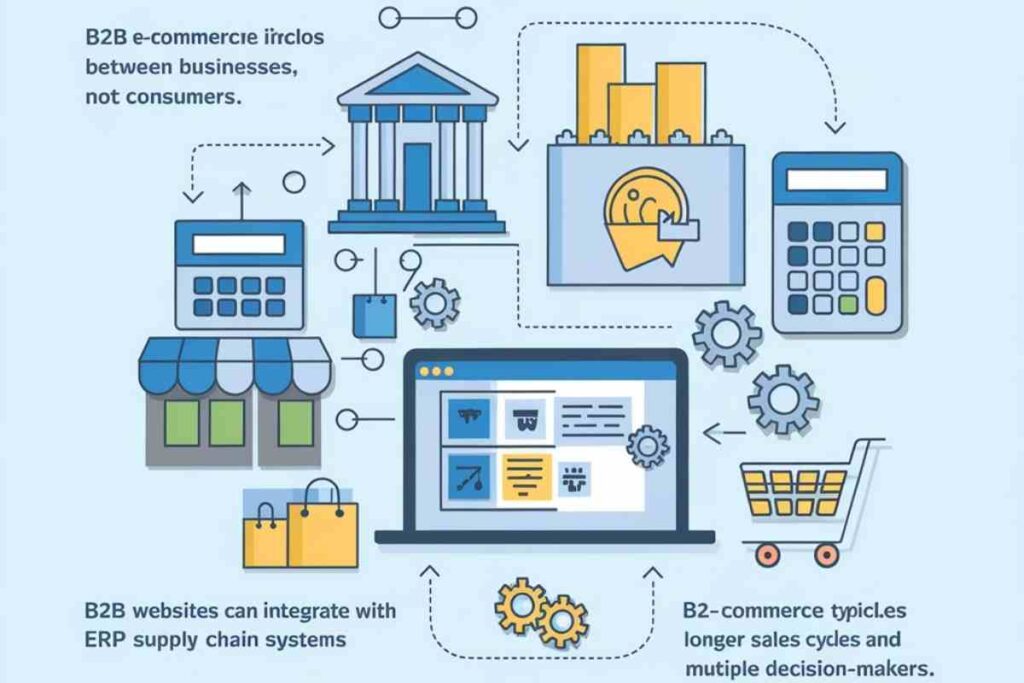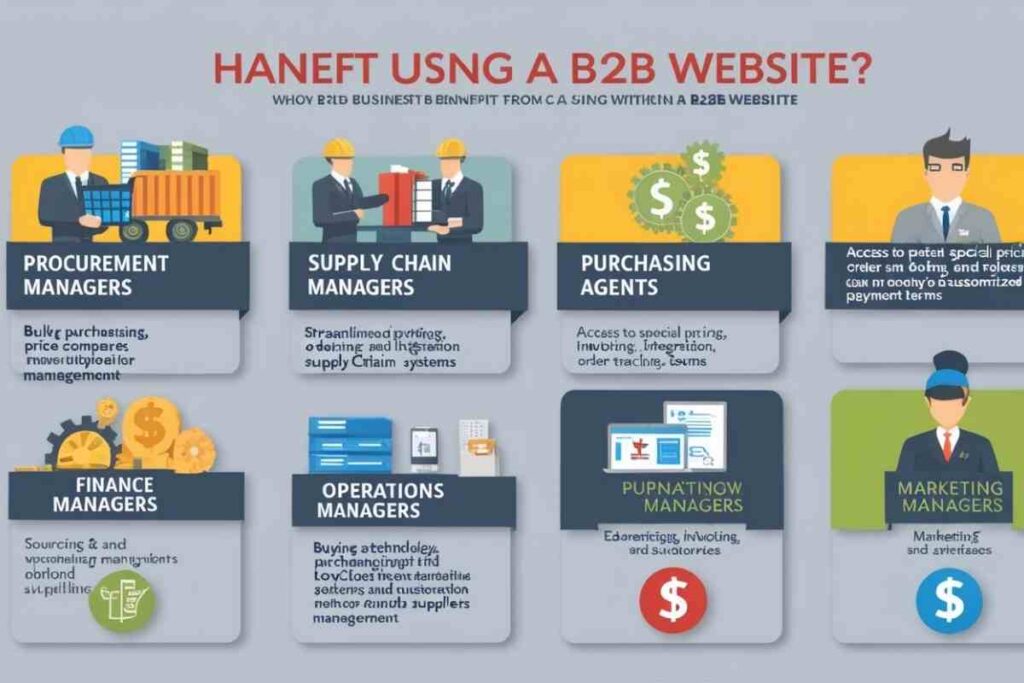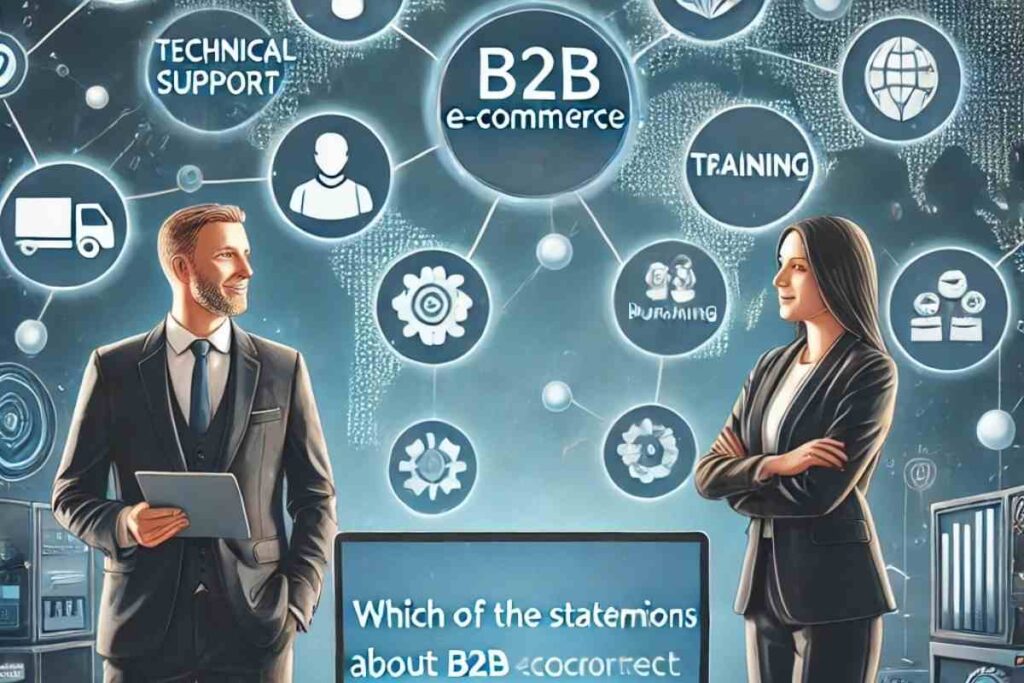Business-to-business (B2B) e-commerce has grown exponentially over the past few years, transforming how businesses source products, services, and information.
Understanding the key aspects of B2B e-commerce can help companies improve their strategies and streamline operations.
In this article, we will explore the various aspects of B2B e-commerce to help you determine which of the statements about B2B e commerce is correct.
Understanding B2B E-Commerce

B2B e-commerce involves transactions between businesses, as opposed to business-to-consumer (B2C) e-commerce, where businesses sell directly to individual consumers.
These transactions are typically larger in volume, more complex in nature, and often involve ongoing relationships between companies.
The Rise of B2B E-Commerce
Over the years, B2B e-commerce has evolved to include a wide range of products and services, from raw materials to software solutions, and even services like technical support and training.
In fact, industries like IT infrastructure, manufacturing, and services have seen a significant shift towards online transactions.
Key B2B E-Commerce Insights:
- Longer sales cycles: Unlike B2C transactions, which can be quick and impulsive, B2B sales are often more methodical and involve multiple decision-makers within the purchasing organization.
- B2B platforms: Platforms like Alibaba, Amazon Business, and others cater specifically to B2B transactions, providing features like bulk purchasing, special pricing, and complex payment terms.
- Integration with ERP systems: Many B2B e-commerce websites integrate directly with enterprise resource planning (ERP) and supply chain management systems to streamline procurement processes.
Key Statements about Which of the statements about b2b e commerce is correct

Shopping Websites Use B2B E-Commerce
This statement is partly correct, but requires clarification. While e-commerce websites like Amazon and eBay serve B2C markets primarily, they also have dedicated sections for B2B transactions.
For example, Amazon Business focuses on bulk purchasing and enterprise-level needs, such as special pricing and invoicing options tailored to business buyers.
However, most dedicated B2B platforms are distinct from general shopping websites and are specifically designed for business transactions, offering features like custom catalogs, multi-user accounts, and specific payment terms.
Examples of B2B Services Include Advertising, Technical Support, and Training
This statement is correct. B2B e-commerce is not limited to products; services such as advertising, technical support, software development, and training are essential components of many B2B transactions.
These services help businesses optimize operations and improve product performance. For instance, a company might purchase a software solution from a provider, which also includes technical support and employee training services.
Examples of B2B Services:
- Advertising: Many B2B businesses engage in targeted advertising campaigns on platforms like LinkedIn to generate leads and drive sales.
- Technical Support: Software providers and equipment manufacturers often offer technical support as part of their B2B services to ensure their products are used effectively.
- Training: Companies often purchase training services to enhance employee skills, particularly when implementing new technologies or systems.
The End Consumer is the Decision-Maker in the Transactions
This statement is incorrect. In B2B e-commerce, the purchasing decision is typically made by a team of individuals within the buying organization, not the end consumer.
These decision-makers evaluate factors such as cost, product specifications, and long-term benefits for the business. In contrast, B2C transactions often involve individual consumers making decisions based on personal preferences and emotions.
B2B decisions are more analytical and involve a process that includes multiple stakeholders, such as procurement officers, finance managers, and department heads.
B2B Websites Offer Fixed, Consistent Pricing for All Purchases
This statement is incorrect. One of the key features of B2B e-commerce is the flexibility of pricing. Unlike B2C transactions, where pricing is typically fixed, B2B e-commerce often involves customized pricing based on factors such as:
- Order volume: Larger orders may qualify for discounts.
- Negotiation: B2B businesses often negotiate pricing based on long-term contracts or partnerships.
- Customer tiering: Businesses that have established relationships with suppliers may receive preferential pricing.
B2B Pricing Flexibility Table:
| Factor | Impact on Pricing |
|---|---|
| Order Volume | Bulk purchases may lead to discounts. |
| Negotiation | Prices may vary based on contract terms. |
| Customer Tiering | Long-term customers often receive lower prices. |
B2B E-Commerce is Often Driven by Long Sales Cycles
This statement is correct. B2B e-commerce transactions typically involve longer sales cycles compared to B2C. The decision-making process can be complex and involve various stakeholders, which can prolong the purchase process.
Additionally, B2B purchases are often high-value and require thorough research, product evaluations, and sometimes pilot tests before finalizing a deal.
Factors Influencing B2B Sales Cycles:
- Multiple decision-makers: The involvement of various departments increases the time needed for consensus.
- Customization needs: Custom-tailored solutions require more time for negotiation and configuration.
- Product complexity: Products that require installation, integration, or support services naturally take longer to purchase.
Which of the following people will benefit the most from using a B2B website

To determine which people will benefit the most from using a B2B website, we need to consider the roles within a business that typically engage in B2B transactions.
B2B websites are tailored to business needs, often offering bulk purchasing, special pricing, customized payment terms, and more complex product solutions.
Here’s a table that highlights various roles and how they benefit from using a B2B website:
| Role | How They Benefit from Using a B2B Website |
|---|---|
| Procurement Managers | Can easily source products and services from multiple suppliers, compare prices, and manage bulk orders. |
| Supply Chain Managers | Benefit from streamlined ordering and integration with supply chain systems, ensuring smooth product flow. |
| Purchasing Agents | Can access special pricing, track orders, and manage payment terms tailored to business needs. |
| Finance Managers | Gain insight into purchasing data for budgeting, managing invoices, and optimizing cash flow through B2B platforms. |
| Operations Managers | Can source the materials or services required for production, ensuring timely availability and better pricing. |
| IT Managers | Can procure technology solutions, software, and services, often with added features like technical support or training. |
| Marketing Managers | Utilize B2B platforms for purchasing advertising, marketing services, and technology solutions. |
| Business Owners/CEOs | Oversee purchasing decisions, negotiate better deals, and track performance across multiple business needs. |
The People Who Benefit the Most:
Procurement Managers and Purchasing Agents are likely to benefit the most from B2B websites because these roles are directly responsible for sourcing products, managing supplier relationships, and securing the best pricing terms, all of which are enhanced by B2B e-commerce platforms.
These platforms streamline the entire purchasing process, provide insights into available products and services, and offer better management of bulk purchases and payment terms.
Why Is B2B E-Commerce Important?
B2B e-commerce offers significant advantages for businesses, such as:
- Improved efficiency: B2B transactions are streamlined through platforms that integrate purchasing, invoicing, and logistics.
- Global reach: Businesses can source products and services from suppliers worldwide, often at lower costs.
- Better data management: With features like customer portals, B2B e-commerce platforms provide businesses with real-time data to optimize procurement and inventory management.
Conclusion
When evaluating which of the statements about B2B e-commerce is correct, we see that several key factors distinguish B2B from other types of commerce.
First, while B2B e-commerce does indeed involve more complex and often longer sales cycles, it also includes various services such as advertising, technical support, and training that are integral to the ecosystem.
FAQS
What is B2B e-commerce?
B2B e-commerce refers to online transactions between businesses. Unlike B2C, where businesses sell to individual consumers, B2B e-commerce involves companies selling goods or services to other businesses, often in bulk or for ongoing partnerships.
How does B2B e-commerce differ from B2C?
The main difference is that B2B involves larger transactions, longer sales cycles, and a more complex decision-making process. B2C is typically quicker, with individual consumers making direct purchases.
What are some examples of B2B e-commerce platforms?
Popular B2B e-commerce platforms include Amazon Business, Alibaba, Made-in-China.com, and eBay Business Supply, where businesses can purchase products in bulk and engage in trade with suppliers globally.
Is pricing fixed in B2B e-commerce?
No, B2B pricing is often flexible. Prices can vary depending on factors like order volume, customer relationships, negotiated contracts, and specific terms agreed upon between businesses.
What services are commonly offered in B2B e-commerce?
B2B e-commerce is not limited to physical products. It often includes services such as advertising, technical support, training, and software solutions, all aimed at helping businesses operate efficiently.
How long are sales cycles in B2B e-commerce?
Sales cycles in B2B e commerce are typically longer than in B2C. Due to higher order values, more complex products, and multiple decision-makers, B2B transactions often require more time for evaluation and negotiation.
Who makes the decisions in B2B e-commerce transactions?
In B2B e commerce, purchasing decisions are generally made by multiple stakeholders within a company, such as procurement managers, finance officers, and department heads. It is not the end consumer, as seen in B2C transactions.
Why is B2B e-commerce important for businesses?
B2B ecommerce offers businesses access to global markets, cost-effective sourcing, and a streamlined purchasing process. It allows companies to improve efficiency, reduce costs, and expand their operations by tapping into digital solutions.


